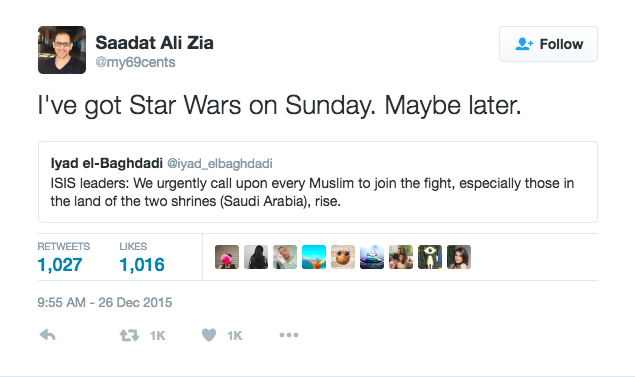Last December, the leader of the Islamic State posted portions of a call-to-action on Twitter intended for Muslims around the world. The words were cut from an audio recording, in which Adu Bakr al-Baghladi declared that taking up arms and “joining the fight” urgently is incumbent on each individual Muslim. However, many Muslims on Twitter found the demand hilarious and reacted to this call to “rise up” with humor, with many complaining that the call came at an inappropriate time as they were busy with a lot of other activities, such as watching Star Wars and following football (Middle East Eye 2015).
In this essay, I argue that Muslim Twitter users’ humorous responses to the ISIS leader’s “rise-up” call shows that resistance can be non-oppositional, creative and transformative. By dismissing the seriousness of the demand, these tweets rendered the ideological oppression imposed by the demand invalid and, to some extent, altered the stereotypical impression of Muslims being humorless extremists that is deeply rooted in Western culture. In this case, humor presents a form of resistance that avoids pure negativity and confrontation, produces positivity and inclusiveness, therefore generating a counter-power that is qualitatively different from the oppressive power it seeks to resist.
In spite of a lack of consensus reached on the definition of resistance in sociology, two elements have been identified as common to most discussions on resistance: action and opposition (Hollander & Einwohner 2004). The idea that resistance has to be in one way or another oppositional has led many scholars to judge resistance based on the extent it engages with direct expression of discontent and confrontational actions. However, Judith Revel points out the limitation of such a preconception. She argues that to define resistance only “as against a power” inevitably turns it into the “reversed double” of that power, since attempting to overthrow oppression also confirms the powerfulness of that oppression (Revel 2008). To avoid becoming the other side of a power requires resistance to move beyond pure rejection, and proceed from a counter-power that contains a creative difference, a qualitative elevation (Revel 2008).
While the idea of non-oppositional, creative resistance may seem challenging to many resistance scholars, the concept is not as unfamiliar as it seems. Humor, for example, has been identified as a non-confrontational form of resistance throughout the relevant literature (Bernal 2013; Becker 2014; Sorensen 2008). Many scholars, such as Yurchak point out that by using satire, parody, ridicule and exaggeration, humor may succeed in exposing the “unspeakable” features that realist critiques and serious political opposition have trouble to articulate within the conventional framework of political expression (Bernal 2014). For instance, the affective nature of humor makes it particularly effective in revealing the absurdity, self-contradiction or hypocrisy in politics. Such an affective dimension can hardly be achieved through reasoning. In addition, Goldstein and Trnka note the productive, transformative effects of humor, stemming from its ability to generate laughter as laughter can eliminate fear and enhance social inclusiveness, as well from its ability to create alternative political spectacles and foster new subjectivities. Both are essential to promoting social change (Bernal 2014; Sorensen 2008).
Muslim Twitter users’ humorous responses to the ISIS leader’s “rise-up” call on Twitter presents a good example of how humor can resist oppression through creative, non-oppositional ways. When analyzing humor as a mechanism, Mulkay distinguished between the serious mode and the humorous mode. While the former operates on logic and reason; in the latter, contradictions, incongruity and misunderstandings are introduced to create amusing effects (Mulkay 1998). The “rise-up” call made by the ISIS leader clearly carries a serious tone. By saying that joining the ISIS is incumbent on each individual Muslim, the call breaks the neutrality of a request and declares itself as a demand that, by its very nature, is oppressive. What this message implicitly conveys is a sense of self-imposed authority, which renders all Muslims objects subordinate to its power and its logic of reasoning, denying their autonomy and free will.
The seriousness of the demand, however, was dismissed when the subjects it addressed chose not to take it seriously. Employing an innocent and almost apologetic tone, the Muslims negotiated that “maybe later” for they already have other plans. The sharp contrast between the seriousness and “sacredness” of the demand and the mundane everyday life activities used as excuses to reject it generated an amusing effect. Yet at the same time, by putting watching Netflix and taking care of pets prior to the “sacred” war, these tweets did more than revealing the absurdity of the demand. They also degraded it. The tweets communicated that fighting a religious war is clearly no more important than a causal job or a minor errand, let alone in any sense revolutionary or sacred.
In contrast to making a serious fact-based critique against the oppressive ISIS ideology, the humorous responses here carry a more powerful underlying message – that the “rise-up” demand is so ridiculous it isn’t even worth being taken seriously. Therefore, by poking fun at a serious political matter, humor exercises a form of power that is different to a confrontational one, for its powerfulness lies not in its engagement with rejection and aggression, but in its transformative effects (Sorensen 2008). The laughter it produces not only reflects discordance, but also transforms discordance by being its active creation.
In addition, the significance of some Muslims Twitter users’ use of humor as resistance is also evident in the way it fostered new subjectivities and created inclusiveness. As the term “terrorism” suggests, the oppression ISIS and other extremist groups impose on anyone other than themselves is based on fear. Their violent attacks in densely populated places show that their primary aim is to cause and spread fear (Altheide, 2006). In this “age of terror”, humor could be an especially useful form of resistance. Many scholars who studied the role of political humor under dictatorship point out that symbolic action-the use of humor in particular-have a profound influence in setting an alternative agenda and changing people’s perception of the situation (Bernal 2013; Becker 2014; Sorensen, 2008). By making fun of things that makes us afraid, we cease being afraid or become less afraid of them. Once this happens, the situation has changed, for we are enabled to act differently based on our new perception of the situation (Sorensen, 2008). Fear is, after all, not a reality, but a perception.
It’s also worth noting the significant political implications of this instance of resistance with regard to the issue of social division. The damage terrorism has brought the world is more than fear. It has increased social division, whereby Muslim people can be stereotyped and isolated (Altheide 2006). In her analysis of the 2006 Danish “Muhammad cartoons” crisis, Kuipers argues that the belief that Muslims are religion-driven, humorless conservatives is deeply rooted in Western culture (Kuipers 2001). The rapid expansion of ISIS has exacerbated this stereotypical impression. In the current Western political sphere, Islam as a religion is too often confused with terrorist ideology and many people concerned that Muslims would be a potential threat to national security. Muslim twitter users’ humorous resistance to the “rise-up” call reveals the absurdity of these concerns. It shows that Muslims not only have a sense of humor, but also appreciate peace and freedom like any non-Muslim person. The laughter generated here challenges the Muslim/non-Muslim boundary and enhances social inclusiveness, as only those who share the same perception of a situation can share the humor of it. (Twark 2014).
Overall, the twitter users’ humorous response to the ISIS leader’s “rise-up” call presents an instance of resistance that is non-oppositional, creative and transformative. By making fun of the political message that is meant to be serious, these tweets not only dismissed its seriousness, but also challenged the politics of fear which the oppression of terrorism operates on. In doing so, new subjectivities are created as people start to perceive the situation differently. Moreover, by using humor as a form of resistance here, Muslim Twitter users also challenged the stereotypical impression of Muslims as humorless extremists in Western culture. In this case, humor as a form of resistance generates a form of counter-power that is qualitatively different from the one it seeks to resist, for its powerfulness lies not in its engagement with rejection and aggression, but in its transformative effects, in the positivity it creates and in the new subjectivities it produces.
Bibliography
Altheide, D. L 2006, “Terrorism and the Politics of Fear” Cultural Studies: Critical Methodologies, vol. 6, no. 4, pp. 415-439.
Becker, A. B 2014, “Playing with Politics: Online Political Parody, Affinity for Political Humor, Anxiety Reduction, and Implications for Political Efficacy”, Mass Communication and Society, 17:3, 424-445.
Bernal, V 2013, “Please forget democracy and justice: Eritrean politics and the powers of humor”, Journal of the American Ethnological Society, vol. 40, no. 2, pp. 300-309.
Hollander, J. A & Einwohner, R. L 2004, “Conceptualizing Resistance”, Sociological Forum, vol. 19, no. 4, pp. 533-553.
Kuipers, G 2011, “The politics of humor in the public sphere: Cartoons, power and modernity in the first transnational humor scandal”, European Journal of Cultural Studies, vol. 14, no. 1, pp. 63-80.
Middle East Eye, Muslims tweet why they are too busy to answer IS ‘rise-up’ call, Available from: http://www.middleeasteye.net/news/muslims-twitter-explain-why-theyre-too-busy-answer-call-rise-535380720 [27 December 2015]
Mulkay, M. J 1988, On Humor: Its Nature and Its Place in Modern Society. Cambridge, UK: Polity Press.
Revel, J 2008 “Resistances, subjectivities, common” on Wattle.
Sorensen, M. J 2008 “Humor as a Serious Strategy of Nonviolent Resistance to Oppression”, Peace & Change, vol. 33, no. 2, pp. 167-190.
Twark, J. E 2014, “The Politics of Humor: Laughter, Inclusion, and Exclusion in the Twentieth Century ed. by Martina Kessel and Patrick Merziger (review)” Monatshefte, vol. 106, no. 2, pp. 323-326.





